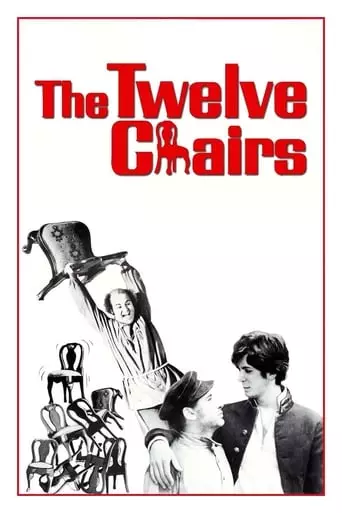
The Twelve Chairs (1970) Watch Online Free
In 1920s Soviet Russia, a fallen aristocrat, a priest and a con artist search for a treasure of jewels hidden inside one of twelve dining chairs, lost during the revolution.
The Twelve Chairs (1970), directed by Mel Brooks, is a dark comedy based on the Russian novel by Ilya Ilf and Evgeny Petrov. The story unfolds in 1927 Soviet Russia, following the journey of a former nobleman, Vorobyaninov, and a cunning con artist, Ostap Bender, as they search for a fortune hidden in the cushions of one of twelve chairs. The treasure, consisting of jewels sewn into the chair’s lining, was hidden by Vorobyaninov’s late mother-in-law, but after the Revolution, the chairs have been seized by the state and redistributed. Their journey is filled with mishaps, rivalries, and satirical commentary on Soviet society.
Vorobyaninov (Ron Moody) is an aristocrat who learns that his late mother-in-law hid jewels in the cushions of one of twelve chairs. After the Bolshevik Revolution, these chairs have been confiscated and scattered across the country. Desperate to reclaim his rightful inheritance, he teams up with Ostap Bender (Frank Langella), a charming and opportunistic con man, who promises to help him recover the treasure. Along their journey, the pair faces various obstacles, including the unpredictable Father Fyodor (Dom DeLuise), who complicates their pursuit.
As they pursue the chairs, the characters reveal their vices and the absurdity of human greed. Brooks uses humor and satire to critique not only the societal collapse in post-Revolutionary Russia but also the universal nature of human selfishness and the pursuit of wealth. The film’s humor is often exaggerated and slapstick, yet it also carries a deeper, more tragic dimension, as the characters’ misadventures ultimately reflect the futility of their quest.
The movie is rich in themes of greed, social injustice, and human folly. Set against the backdrop of the Soviet Union, it critiques the new regime’s promises of equality while exposing the corruption and exploitation that persist in society. The characters are driven by selfish desires, underscoring the idea that, regardless of political systems, human nature remains unchanged. The search for material wealth becomes symbolic of larger existential and moral dilemmas—are we truly free, or are we just slaves to our desires?
Brooks’ adaptation of the story emphasizes the absurdity of Soviet bureaucracy and the cynical manipulation of power. It also satirizes the incompetence and opportunism that characterize both the aristocracy and the newly rising class under Soviet rule. The pursuit of the chairs becomes not just a chase for riches but a commentary on how the pursuit of power and wealth leads to chaos, destruction, and the eventual loss of human dignity.
After watching The Twelve Chairs, you will likely feel a mix of amusement and reflection. While the film’s humor will leave you laughing, the underlying themes of greed, loss, and futility may linger in your mind, offering a more somber reflection on human nature. The absurd situations in the film might lead to a sense of disbelief at how far people will go for wealth, while the film’s sharp critique of society invites you to think about the larger, often ironic, forces at play in any societal system.
In conclusion, The Twelve Chairs is not just a comedy but a thoughtful and satirical exploration of human behavior, making it both an entertaining and intellectually stimulating watch. The blend of humor, political satire, and poignant moments ensures it is a film that stays with you long after the credits roll
